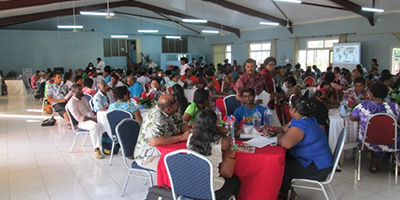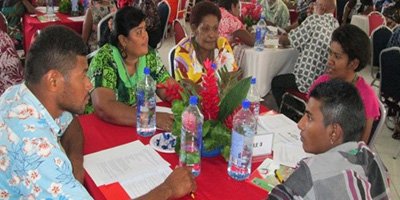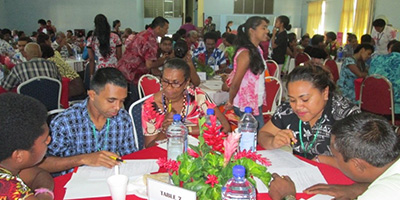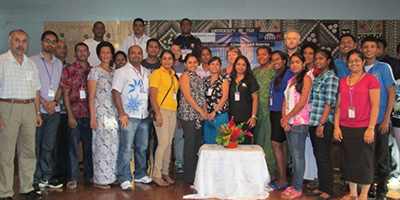Climate change and global warming is not only the foremost environmental challenge the world faces today, but one of the most crucial, critical and pertinent issue facing all of humanity. Consequently, it is everyone’s prime responsibility to do their part and raise awareness and be responsive to global warming and the tribulations we face in promoting a sustainable environmental future for our planet. The University of Fiji and Project Survival Pacific (PSP) in collaboration with the United Nations Framework Convention on Climate Change (UNFCCC) and support of the French Government, organized a first ever World Wide Views on Climate and Energy for Fiji on 6th of June, 2015 at the University of Fiji. World Wide Views on Climate and Energy is a global citizen participation project on global Climate and Energy policies and actions and with its collaboration with Centre for Climate Change, Energy, Environment and Sustainable Development at the University of Fiji was the first in the world to herald this global endeavor.
Indisputably, this world wide views on climate change was the first for Fiji. This event witnessed 150 Fijian citizens of a diverse group from ages 18 and above expressed their views which have irrefutably been recognized worldwide. The outcomes of the consultation will introduce the opinions of the Fijian citizens into the COP21 summit in France. This colossal event offered Fijian citizens with a great opportunity and platform to voice their opinions on climate change and issues pertaining to it and its repercussions in an island nation as ours.


In addition, The World Wide Views 2015 on Climate and Energy is coordinated by the Danish Board of Technology in collaboration with Missions Publiques and the French National Commission for Public Debate and co-initiated by the UNFCCC. The project is funded by the French Ministry of Ecology, Sustainable Development and Energy (MEDDE), through the Association des Régions de France.
On the day of the event, The University of Fiji’s then Acting Vice Chancellor, Professor Narendra Reddy officially welcomed the participants and applauded their efforts into making this summit a reality. The Project Manager for World Wide Views on Climate and Energy, Ms. Priyatma Singh shed light on citizens’ consultation process, necessitating all Fijians to raise their voice on issues pertaining to climate change. The University was gratified with the presence of the guest of honor for the day, Principal Agriculture Officer, Western, Mr. Vinesh Kumar, for gracing such an indispensable program for World Wide Views in Fiji Islands. Mr Kumar too shared his thoughts on climate change adding it was indeed a buzzing issue in Fiji and across the globe, stressing everyone’s responsibility to ensure we live in a sustainable world today and for posterity to come. Also, the Technical Project Manager, Mr. Ramendra Prasad enlightened the participants of the consultation process.
With an overwhelming citizen participation in making a difference, the Project Manager/ Head Facilitator- Priyatma Singh commenced the consultation process by introducing the participants to the first thematic session which was an introduction to climate change, its consequences and the need to shift to a low carbon economy. This session explained the current and future impacts, causes, and risks and posing questions like: What is climate change? Is it caused by humans? What is greenhouse effect? What is known about the impacts of climate change in different parts of the world? Are there risks of climate change getting out of control?


The second thematic session was about tools to tackle climate change. Here, the participants looked at the cost of cutting carbon emissions. In the third thematic session, the citizens were informed of the role of the United Nations, and the climate negotiations. What is on the table at the UN climate conference in Paris at the end of this year? Countries have been talking about climate change for more than 20 years. What difference can Paris make? One question is whether all countries should agree a global target to slash greenhouse gas emissions. Would this help, and can they agree to this?
The fourth session presented the citizens with an opportunity to highlight ways in which their country can meaningfully contribute to reducing global warming. The final session was about how to make sure that countries keep their promises and encourage them to give in their opinions to resolving climate change and making a difference. By the end of the fifth thematic session, all the participants successfully shared their ideas and crystallized their opinions on one of the greatest challenges of this generation. All the five sessions had videos which the participants watched, followed by interactive forum and then they were given ample time to cast their votes on a series of questions based on the videos they watched. During the day, The University of Fiji organizers were able to have Skype session with Japan who too hosted similar worldwide views on climate and Energy. After each session results were collated and data entry shared online with the rest of the world. Also, with the presence of the funding body, the French Embassy’s, Ms Anne-Sophie Gernez as international observer ensured a swift progression of the consultation process.
In summation, we can describe the ocean as the sea of many colors and there is the Joseph’s coat of many colors in the Bible, and with many colors participants have made it a unique engagement with men and women, adults and teenagers of all races from all over Fiji – the east, the north, the central and the west. The consultation process ended on a high, objectives for the day met, participants received a certificate of recognition and definitely their views shared with the rest of the world. Participants’ consultation does not end here; the plea the organizers made was for them to return to their own villages, settlements, towns and cities and continue to raise awareness as climate change has impacts for almost all people around the world. We are already experiencing climate change in all continents, and changes in weather that could be a result of climate change. Our children and grandchildren may live to experience more dramatic consequences. Politicians may determine the future of the planet, but as a citizen, and your children, will have to live with the consequences. Therefore, every citizens opinion was taken into consideration and data forwarded.
![]()
